(非常全)人教高中英语必修一各单元知识点汇总
新人教版高一英语必修一知识点复习整理

新人教版高一英语必修一知识点复习整理1. 语法知识点
- 介词的用法
- 表示时间、地点和方式等
- 注意介词和动词的搭配
- 冠词的用法
- 不定冠词a和an的用法
- 定冠词the的用法
- 名词的单复数形式
- 一般名词的复数形式
- 不规则名词的复数形式
2. 词汇知识点
- 常用动词短语
- 与各种情境相关的常用动词短语
- 包括表示喜欢、讨厌、担心、希望等意思的动词短语
- 常用形容词及副词
- 描述人、事物特征的常用形容词
- 表示时间、程度、方式等的常用副词- 高频词汇
- 重点掌握高频出现的单词和常用短语3. 阅读技巧
- 预测文意
- 根据上下文预测单词或句子的意思
- 联系上下文理解文章
- 通过上下文的线索来理解全文意思
- 抓住文中关键信息
- 注意文章中的重点句子,理解文章主旨4. 写作技巧
- 语法正确性
- 注意动词时态和主谓一致
- 尽量避免语法错误
- 结构完整性
- 确保文章有开头、主体和结尾
- 逻辑连贯性
- 使用适当的连接词
- 使用连接词使句子和句子之间衔接紧密
以上是《新人教版高一英语必修一》的知识点复习整理,希望对你的学习有所帮助。
新教材 人教版高中英语必修第一册全册各单元知识点提炼汇总(单词短语语法写作等)
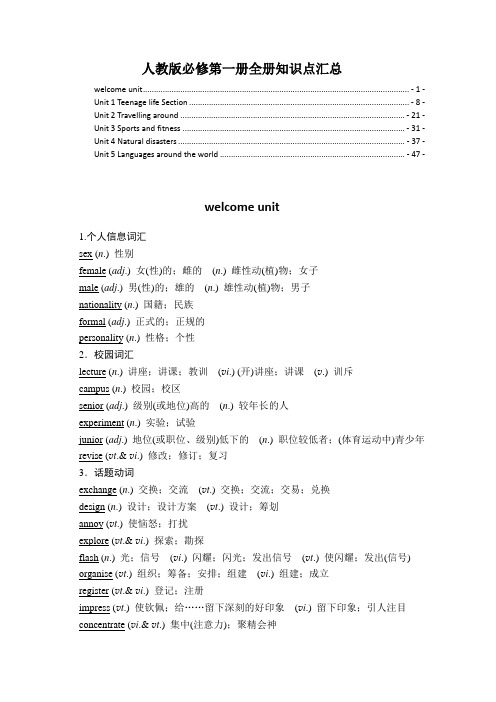
人教版必修第一册全册知识点汇总welcome unit ......................................................................................................................... - 1 - Unit 1 Teenage life Section .................................................................................................... - 8 - Unit 2 Travelling around ...................................................................................................... - 21 - Unit 3 Sports and fitness ..................................................................................................... - 31 - Unit 4 Natural disasters ....................................................................................................... - 37 - Unit 5 Languages around the world .................................................................................... - 47 -welcome unit1.个人信息词汇sex (n.) 性别female (adj.) 女(性)的;雌的(n.) 雌性动(植)物;女子male (adj.) 男(性)的;雄的(n.) 雄性动(植)物;男子nationality (n.) 国籍;民族formal (adj.) 正式的;正规的personality (n.) 性格;个性2.校园词汇lecture (n.) 讲座;讲课;教训(v i.) (开)讲座;讲课(v.) 训斥campus (n.) 校园;校区senior (adj.) 级别(或地位)高的(n.) 较年长的人experiment (n.) 实验;试验junior (adj.) 地位(或职位、级别)低下的(n.) 职位较低者;(体育运动中)青少年revise (v t.& v i.) 修改;修订;复习3.话题动词exchange (n.) 交换;交流(v t.) 交换;交流;交易;兑换design (n.) 设计;设计方案(v t.) 设计;筹划annoy (v t.) 使恼怒;打扰explore (v t.& v i.) 探索;勘探flash (n.) 光;信号(v i.) 闪耀;闪光;发出信号(v t.) 使闪耀;发出(信号) organise (v t.) 组织;筹备;安排;组建(v i.) 组建;成立register (v t.& v i.) 登记;注册impress (v t.) 使钦佩;给……留下深刻的好印象(v i.) 留下印象;引人注目concentrate (v i.& v t.) 集中(注意力);聚精会神improve (v i.& v t.) 改进;改善4.话题描述性词汇anxious (adj.) 焦虑的;不安的annoyed (adj.) 恼怒的;生气的frightened (adj.) 惊吓的;害怕的outgoing (adj.) 爱交际的;外向的awkward (adj.) 令人尴尬的;难对付的confident (adj.) 自信的;有把握的curious (adj.) 好奇的;求知欲强的forward (ad v.) (also forwards) 向前;前进(adj.) 向前的;前进的5.话题名词registration (n.) 登记;注册;挂号nation (n.) 国家;民族;国民designer (n.) 设计者impression (n.) 印象;感想confidence (n.) 信心;信任guy (n.) 小伙子;男人;家伙organisation (n.) 组织;团体;机构goal (n.) 目标;球门;射门strategy (n.) 策略;策划partner (n.) 同伴;配偶;合伙人company (n.) 公司;商行;陪伴style (n.) 方式;作风6.话题短语senior_high_school 〈美〉高中at_last 终于;最终make_an_impression 留下好印象what_if 要是……会怎么样呢concentrate_on 集中精力于leave ... alone 不打扰;不惊动junior_high_school 〈美〉初级中学look_forward_to 盼望,期待take_notes 记笔记flash_card 教学卡片;识字卡重点知识合作探究Our school invited two engineers to design_a_language_lab_for_us.我们学校邀请了两位工程师为我们设计一个语言实验室。
人教版高中英语必修一知识点大全
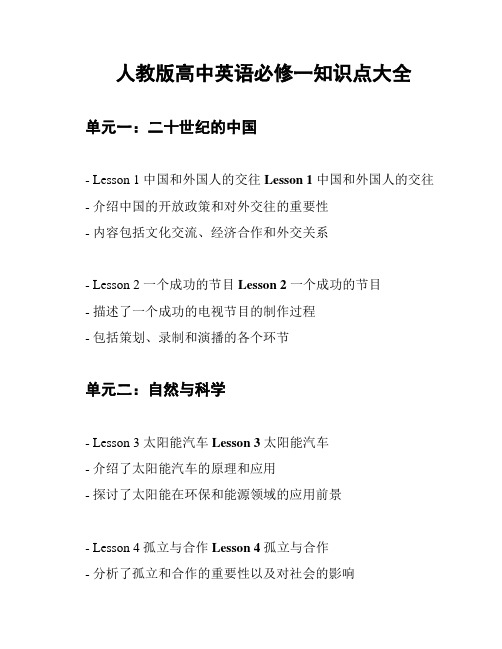
人教版高中英语必修一知识点大全单元一:二十世纪的中国- Lesson 1 中国和外国人的交往Lesson 1中国和外国人的交往- 介绍中国的开放政策和对外交往的重要性- 内容包括文化交流、经济合作和外交关系- Lesson 2 一个成功的节目Lesson 2一个成功的节目- 描述了一个成功的电视节目的制作过程- 包括策划、录制和演播的各个环节单元二:自然与科学- Lesson 3 太阳能汽车Lesson 3太阳能汽车- 介绍了太阳能汽车的原理和应用- 探讨了太阳能在环保和能源领域的应用前景- Lesson 4 孤立与合作Lesson 4孤立与合作- 分析了孤立和合作的重要性以及对社会的影响- 举例说明了合作在科学研究和国际合作中的作用单元三:身心健康- Lesson 5 关于睡眠的调查Lesson 5关于睡眠的调查- 描述了一项关于睡眠惯的调查结果- 分析了睡眠对身心健康的重要性并提出相关建议- Lesson 6 过度分析带来的压力Lesson 6过度分析带来的压力- 探讨了过度分析和压力之间的关系- 提供了减轻压力的方法和建议单元四:青少年与休闲- Lesson 7 网络休闲与现实沟通Lesson 7网络休闲与现实沟通- 分析了网络休闲和现实沟通的特点及其影响- 强调了健康使用网络的重要性和培养现实沟通能力的必要性- Lesson 8 如何选择适合的休闲方式Lesson 8如何选择适合的休闲方式- 提供了选择适合的休闲方式的建议- 强调了均衡安排研究和休闲的重要性单元五:传统文化- Lesson 9 传统节日的起源与庆祝方式Lesson 9传统节日的起源与庆祝方式- 介绍了一些中国传统节日的起源和庆祝方式- 分析了传统节日对文化传承的意义- Lesson 10 文化输出与文化遗存Lesson 10文化输出与文化遗存- 分析了文化输出和文化遗存的概念和影响- 讨论了文化保护和传播的重要性单元六:生活与研究- Lesson 11 如何研究高效Lesson 11如何学习高效- 提供了高效研究的方法和技巧- 强调了良好的研究惯和时间管理的重要性- Lesson 12 大学生活和社会责任Lesson 12大学生活和社会责任- 探讨了大学生活和社会责任的关系- 提出了大学生应该承担的社会责任以上是人教版高中英语必修一的知识点大全。
人教版高中英语必修1知识点汇总(一册全)
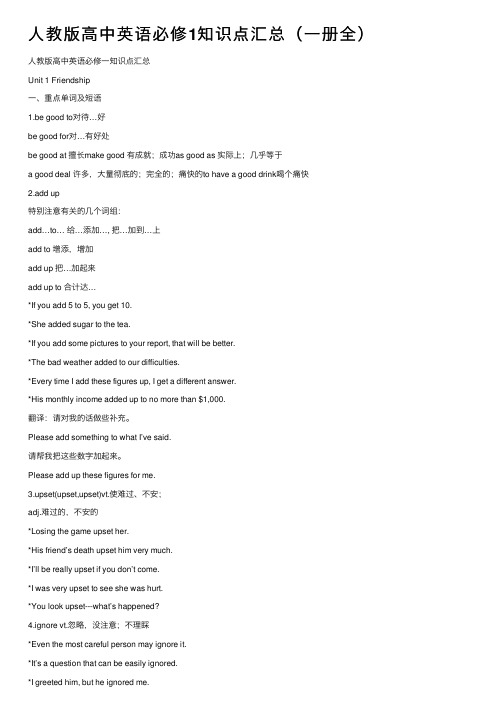
⼈教版⾼中英语必修1知识点汇总(⼀册全)⼈教版⾼中英语必修⼀知识点汇总Unit 1 Friendship⼀、重点单词及短语1.be good to对待…好be good for对…有好处be good at 擅长make good 有成就;成功as good as 实际上;⼏乎等于a good deal 许多,⼤量彻底的;完全的;痛快的to have a good drink喝个痛快2.add up特别注意有关的⼏个词组:add…to… 给…添加…, 把…加到…上add to 增添,增加add up 把…加起来add up to 合计达…*If you add 5 to 5, you get 10.*She added sugar to the tea.*If you add some pictures to your report, that will be better.*The bad weather added to our difficulties.*Every time I add these figures up, I get a different answer.*His monthly income added up to no more than $1,000.翻译:请对我的话做些补充。
Please add something to what I’ve said.请帮我把这些数字加起来。
Please add up these figures for me.3.upset(upset,upset)vt.使难过、不安;adj.难过的,不安的*Losing the game upset her.*His friend’s death upset him very much.*I’ll be really upset if you don’t come.*I was very upset to see she was hurt.*You look upset---what’s happened?4.ignore vt.忽略,没注意;不理睬*Even the most careful person may ignore it.*It’s a question that can be easily ignored.*I greeted him, but he ignored me.5.calm adj.平静的,镇静的;风平浪静的vt.使平静*After the storm, the sea was calm again.*Keep calm in time of danger.*Don’t be nervous; calm yourself, please.calm down平静下来*I told him to calm down.6.concern vt.关系到,和…有关;使关⼼*This matter concerns all of us.*I’m not concerned with this matter again.be concerned about关⼼…;为…担⼼*Please don’t be concerned about me.7.go through 经历,经受;审阅,检查*Most families went through a lot during the war. *I can’t go through these letters in an hour.8. “make her diary her best friend”“call my friend Kitty”make和call都能以名词作宾语补⾜语,即make+sb./sth.+n. 使某⼈/某物成为…call+sb./sth.+n. 称某⼈/某物为…*We must try to make our country a strong one.*All work and no play makes Jack a dull boy.*We called messenger msn in short.*What do you call it?9.everything to do with naturesomething/anything/everything/nothing to do with 与…有关/⽆关*What he is doing has nothing to do with his work.10.far too much实在太多too much(+n.)太多(…), 超过某⼈的能⼒far/much too+adj./adv.实在太…too much homeworkThe work is too much for a boy like him.It’s (much/far) too hot todaymuch/ far too much实在太多11.suffer vi.受苦,受痛苦,受损失vt.受到,遭受*He suffered terribly when his mother died.*He looked pale, and seemed to have suffered a lot/a great deal. *We suffered a set-back/no pain. suffer from遭受,患(病)*I suffered much from lack of rest.suffer from cold/cancer12.recover vt.恢复vi.痊愈*She recovered her health.*Amy is recovering from a severe illness.*He is unlikely to recover.13.get tired of对…开始感到厌烦(表动作)be tired of对…感到厌烦(表状态)14.get along with和…相处;进展*They get along quite well with each other.*How are you getting along with your classmates?*How are you getting along with your English?*I’m getting along well with my study.15.exactly adv.确切地;正是;说的对*You must tell me exactly what you’re doing?*That’s exactly what I want.*It looks exactly like an elephant’s leg.*Exactly!(=That’s right.)16.grateful adj.感激的*I’m very grateful to you for your advice.=Thank you very much for your advice.17.joinA.参加,加⼊(成为其中的成员)*He joined the army/the Party 3 years ago.*He is too young to join the club.B.join sb.和某⼈⼀起(从事某活动)*Will you join us for dinner?*I’ll join you later.*May I join you in the game?C.join in参加某活动(=take part in)*A lot of newcomers joined in the discussion.*May I join in the game?⼆、重点句型1. Do you want a friend whom you could tell everything to, like your deepest feelings and thoughts?2. I wonder if it’s because I haven’t been able to be outdoors for so long that I’ve grown so crazy about everything to do with nature.3. I can well remember that there was a time when a deep blue sky, the song of the birds, moonlight and flowers could never have kept me spellbound.4. It’s no pleasure looking through these any longer because nature is one thing that really must be experienced.5. It/This/That is the first /second…time that+现在完成时“某⼈第⼀/⼆次做……”eg. It is the first time that I have been to the airport.It/This/That was the first / second…timethat+过去完成时eg. It was the second time that I had seen him.三、语法语法----直接引语和间接引语概念:直接引语:直接引述别⼈的原话。
人教版高一英语必修一知识点总结五篇
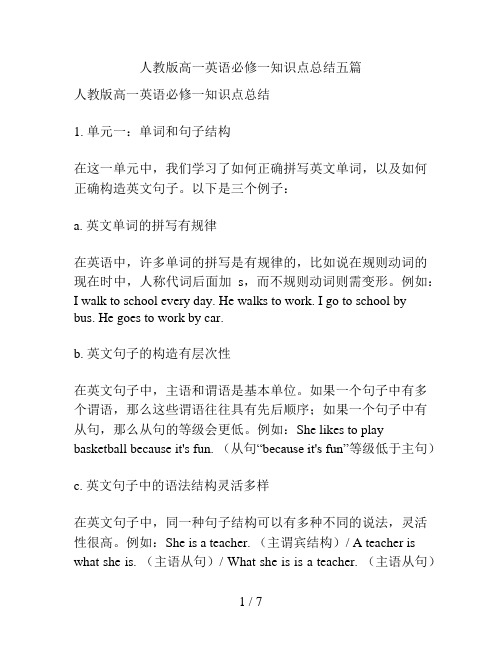
人教版高一英语必修一知识点总结五篇人教版高一英语必修一知识点总结1. 单元一:单词和句子结构在这一单元中,我们学习了如何正确拼写英文单词,以及如何正确构造英文句子。
以下是三个例子:a. 英文单词的拼写有规律在英语中,许多单词的拼写是有规律的,比如说在规则动词的现在时中,人称代词后面加s,而不规则动词则需变形。
例如:I walk to school every day. He walks to work. I go to school by bus. He goes to work by car.b. 英文句子的构造有层次性在英文句子中,主语和谓语是基本单位。
如果一个句子中有多个谓语,那么这些谓语往往具有先后顺序;如果一个句子中有从句,那么从句的等级会更低。
例如:She likes to play basketball because it's fun. (从句“because it's fun”等级低于主句)c. 英文句子中的语法结构灵活多样在英文句子中,同一种句子结构可以有多种不同的说法,灵活性很高。
例如:She is a teacher. (主谓宾结构)/ A teacher is what she is. (主语从句)/ What she is is a teacher. (主语从句)2. 单元二:课文阅读在这一单元中,我们学习了如何正确理解英文课文的内容,并提高了对英文阅读的兴趣和能力。
以下是三个例子:a. 英文课文中的语言运用丰富多样英文课文中的语言运用很丰富,包括比喻、暗示、转喻等等,需要我们认真阅读并理解。
例如:The sky was a bright shade of blue. (比喻)/ Her words cut him like a knife. (转喻)b. 英文课文中的句式多种多样英文课文中的句式也很多样,有短句和长句、简单句和复合句等等。
我们需要慢慢地理解它们,并掌握如何从中获取信息。
高中英语(新人教版)必修一知识点归纳

高中英语必修一知识点归纳Welcome Unit知识点归纳Part one Vocabulary1. exchange n.交换;交流vt.交换;交流;交易;兑换In exchange (for...)作为(与......的)交换exchange student 交换生exchange A for B 以A交换B:把A兑换成B exchange sth. with sb. 与某人交流/交换某物exchange opinions/ideas/views交流意见/想法/看法2. design1) n. 设计;图案;构思;打算,意图。
make designs for 为......做设计by design(=on purpose)故意地2) vt.设计,构思;计划;意欲。
design sth. for... 为...设计某物be designed to do... 旨在做...,用于做...3. anxious adj. 焦虑的;不安的be anxious for sb./ about sth. 为某人/某事担心be anxious for...渴望...be anxious (for sb.) to do sth. 渴望(某人)做某事be anxious that... 渴望...4. annoyed adj. 恼怒的;生气的be annoyed with sb.生某人的气be annoyed at/about sth.因某事生气be annoyed to do做...感到生气5. senior adj. 级别(或地位)高的n. 较年长的人senior high (school)高中be senior to sb. 比某人的地位/职位高6. impress vt. 使钦佩;给……留下深刻的好印象vi. 留下印象;引人注目have a(n) ...impression of... 对······有······印象leave/make a(n) ...impression on sb. 给某人留下······印象(be) under the impression that... 以为······,(通常指)误认为······7. concentrate on 集中精力于8. leave...alone 不打扰,不惊动9. explore vt.& vi. 探索;勘探exploration n. 探索,探测explorer n. 探险者;勘探者;考察者10. confident adj. 自信的;有把握的be confident about 对......有信心be confident of (doing) sth.对(做)······有把握be confident that... 确信······11. look forward to 盼望;期待12. organise vt. 组织;筹备;安排;组建vi. 组建;成立organisation n. 组织;团体;机构Part two Grammar句子成分和基本句型一、句子成分构成句子的各个部分叫作句子成分。
高一英语必修一知识点归纳
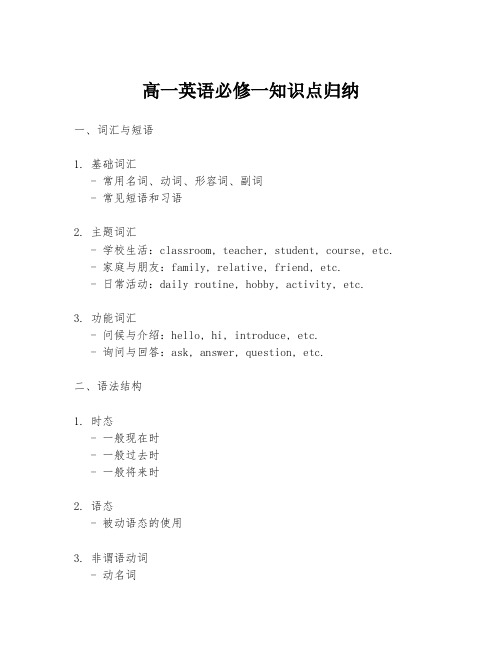
高一英语必修一知识点归纳一、词汇与短语1. 基础词汇- 常用名词、动词、形容词、副词- 常见短语和习语2. 主题词汇- 学校生活:classroom, teacher, student, course, etc. - 家庭与朋友:family, relative, friend, etc.- 日常活动:daily routine, hobby, activity, etc.3. 功能词汇- 问候与介绍:hello, hi, introduce, etc.- 询问与回答:ask, answer, question, etc.二、语法结构1. 时态- 一般现在时- 一般过去时- 一般将来时2. 语态- 被动语态的使用3. 非谓语动词- 动名词- 分词(现在分词和过去分词)4. 句型- 简单句- 并列句- 复合句(定语从句、状语从句等)三、阅读理解1. 阅读技巧- 快速阅读(Skimming)- 精读(Scanning)- 推断与预测2. 文章类型- 记叙文- 议论文- 说明文3. 常见问题类型- 事实细节题- 主旨大意题- 推理判断题四、写作技巧1. 写作格式- 书信- 日记- 议论文2. 写作要点- 明确主题 - 逻辑清晰 - 语言准确3. 写作技巧- 使用连接词 - 段落结构 - 多样句式五、听力技巧1. 听力策略- 预测- 注意力集中 - 关键词捕捉2. 听力材料- 对话- 短文- 讲座3. 听力题型- 信息匹配 - 细节理解 - 推理判断六、口语表达1. 发音- 音标学习- 单词发音- 句子重音和语调2. 日常对话- 问候与告别- 邀请与应答- 请求帮助3. 讨论与演讲- 表达观点- 支持论点- 结束语请注意,以上内容是一个基础框架,您可以根据具体的教学大纲和学生的学习情况进行调整和补充。
在Word文档中,您可以使用标题、子标题、列表和表格等格式化工具来使文档更加清晰和专业。
此外,为了确保文档的可编辑性和可操作性,建议使用清晰和标准的字体,如Times New Roman或Arial,并确保文档的页边距、行距和段落格式符合标准文档的要求。
高中英语人教版必修一知识点总结详细
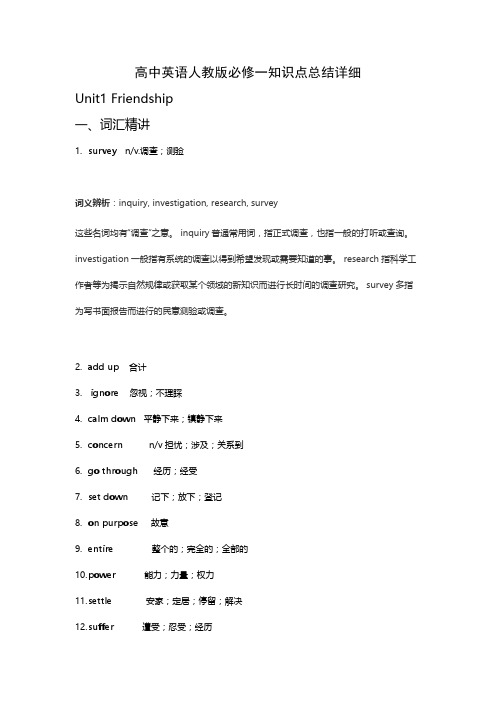
高中英语人教版必修一知识点总结详细
Unit1 Friendship
一、词汇精讲
1.survey n/v.调查;测验
词义辨析:inquiry, investigation, research, survey
这些名词均有“调查”之意。
inquiry普通常用词,指正式调查,也指一般的打听或查询。
investigation一般指有系统的调查以得到希望发现或需要知道的事。
research指科学工作者等为揭示自然规律或获取某个领域的新知识而进行长时间的调查研究。
survey多指为写书面报告而进行的民意测验或调查。
2.add up合计
3. ignore忽视;不理睬
4.calm down 平静下来;镇静下来
5.concern n/v担忧;涉及;关系到
6.go through经历;经受
7.set down 记下;放下;登记
8.on purpos e 故意
9.entire整个的;完全的;全部的
10.p ower 能力;力量;权力
11.s ettle安家;定居;停留;解决
12.s uffer遭受;忍受;经历
13.r ecover 痊愈;恢复;重新获得
14.g et along with 与.......相处;进展
15.f all in love 相爱;爱上
16.t ip n.提示;技巧;尖;尖端;小费 V.倾斜;翻到
17.s wap交换。
人教版高中英语必修一知识点+语法总结(全面)
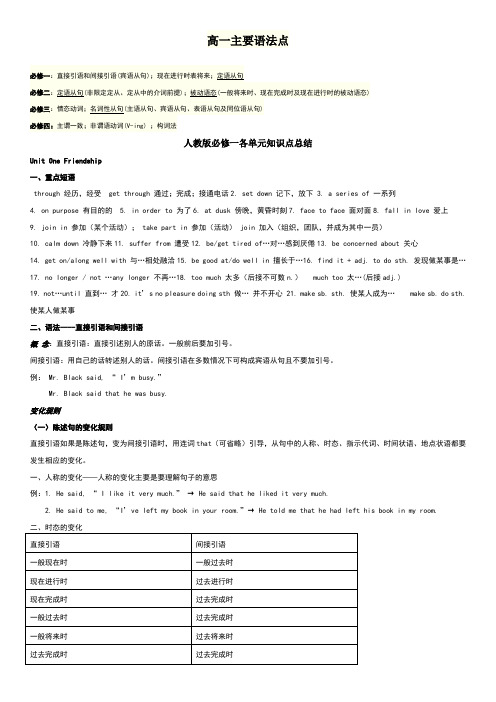
高一主要语法点人教版必修一各单元知识点总结Unit One Friendship一、重点短语through 经历,经受 get through 通过;完成;接通电话2. set down 记下,放下 3. a series of 一系列4. on purpose 有目的的5. in order to 为了6. at dusk 傍晚,黄昏时刻7. face to face 面对面8. fall in love 爱上9. join in 参加(某个活动); take part in 参加(活动) join 加入(组织,团队,并成为其中一员)10. calm down 冷静下来11. suffer from 遭受12. be/get tired of…对…感到厌倦13. be concerned about 关心14. get on/along well with 与…相处融洽15. be good at/do well in 擅长于…16. find it + adj. to do sth. 发现做某事是…17. no longer / not …any longer 不再…18. too much 太多(后接不可数n.) much too 太…(后接adj.)19. not…until 直到… 才20. it’s no pleasure doing sth 做… 并不开心 21. make sb. sth. 使某人成为… make sb. do sth. 使某人做某事二、语法----直接引语和间接引语概念:直接引语:直接引述别人的原话。
一般前后要加引号。
间接引语:用自己的话转述别人的话。
间接引语在多数情况下可构成宾语从句且不要加引号。
例:Mr. Black said, “ I’m busy.”Mr. Black said that he was busy.变化规则(一)陈述句的变化规则直接引语如果是陈述句,变为间接引语时,用连词that(可省略)引导,从句中的人称、时态、指示代词、时间状语、地点状语都要发生相应的变化。
高一英语人教版必修第一单元知识点
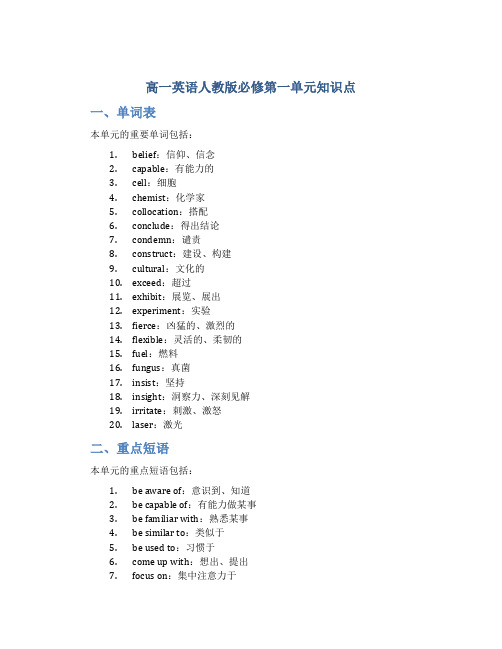
高一英语人教版必修第一单元知识点一、单词表本单元的重要单词包括:1.belief:信仰、信念2.capable:有能力的3.cell:细胞4.chemist:化学家5.collocation:搭配6.conclude:得出结论7.condemn:谴责8.construct:建设、构建9.cultural:文化的10.exceed:超过11.exhibit:展览、展出12.experiment:实验13.fierce:凶猛的、激烈的14.flexible:灵活的、柔韧的15.fuel:燃料16.fungus:真菌17.insist:坚持18.insight:洞察力、深刻见解19.irritate:刺激、激怒ser:激光二、重点短语本单元的重点短语包括:1.be aware of:意识到、知道2.be capable of:有能力做某事3.be familiar with:熟悉某事4.be similar to:类似于5.be used to:习惯于e up with:想出、提出7.focus on:集中注意力于8.have an effect on:对…产生影响9.make sense:有意义、讲得通10.play a role:发挥作用11.stick to:坚持三、重要语法点本单元的重要语法点包括:1. 句子结构英语句子的基本结构是主语(S)+动词(V)+宾语(O),但也可以有其他成分。
a) 主语主语是句子中的施动者或做动作的人或事物。
例子: - Dogs (主语) are barking loudly.(狗在大声吠叫。
) - He (主语) studies English every day.(他每天学英语。
)b) 动词动词表示主语的动作、状态或存在。
例子: - The cat (主语) is sleeping (动词) on the sofa.(猫正在沙发上睡觉。
) - She (主语) has (动词) a lot of homework to do.(她有很多作业要做。
人教高中英语必修一知识点汇总
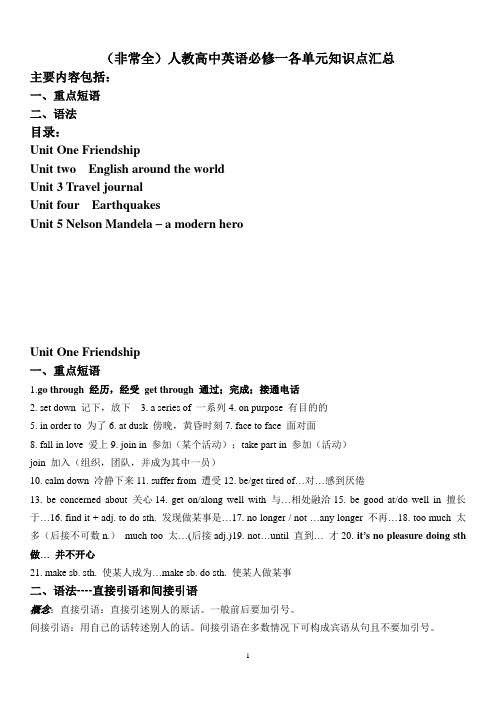
(非常全)人教高中英语必修一各单元知识点汇总主要内容包括:一、重点短语二、语法目录:Unit One FriendshipUnit two English around the worldUnit 3 Travel journalUnit four EarthquakesUnit 5 Nelson Mandela – a modern heroUnit One Friendship一、重点短语1.go through 经历,经受get through 通过;完成;接通电话2. set down 记下,放下3. a series of 一系列4. on purpose 有目的的5. in order to 为了6. at dusk 傍晚,黄昏时刻7. face to face 面对面8. fall in love 爱上9. join in 参加(某个活动);take part in 参加(活动)join 加入(组织,团队,并成为其中一员)10. calm down 冷静下来11. suffer from 遭受12. be/get tired of…对…感到厌倦13. be concerned about 关心14. get on/along well with 与…相处融洽15. be good at/do well in 擅长于…16. find it + adj. to do sth. 发现做某事是…17. no longer / not …any longer 不再…18. too much 太多(后接不可数n.)much too 太…(后接adj.)19. not…until 直到…才20. it’s no pleasure doing sth 做…并不开心21. make sb. sth. 使某人成为…make sb. do sth. 使某人做某事二、语法----直接引语和间接引语概念:直接引语:直接引述别人的原话。
(完整版)人教高中英语必修一各单元知识点汇总

(非常全)人教高中英语必修一各单元知识点汇总主要内容包括:一、重点短语二、语法目录:Unit One FriendshipUnit two English around the worldUnit 3 Travel journalUnit four EarthquakesUnit 5 Nelson Mandela – a modern heroUnit One Friendship一、重点短语1.go through 经历,经受get through 通过;完成;接通电话2. set down 记下,放下3. a series of 一系列4. on purpose 有目的的5. in order to 为了6. at dusk 傍晚,黄昏时刻7. face to face 面对面8. fall in love 爱上9. join in 参加(某个活动);take part in 参加(活动)join 加入(组织,团队,并成为其中一员)10. calm down 冷静下来11. suffer from 遭受12. be/get tired of…对…感到厌倦13. be concerned about 关心14. get on/along well with 与…相处融洽15. be good at/do well in 擅长于…16. find it + adj. to do sth. 发现做某事是…17. no longer / not …any longer 不再…18. too much 太多(后接不可数n.)much too 太…(后接adj.)19. not…until 直到…才20. it’s no pleasure doing sth 做…并不开心21. make sb. sth. 使某人成为…make sb. do sth. 使某人做某事二、语法----直接引语和间接引语概念:直接引语:直接引述别人的原话。
人教版高中英语必修一知识点超详细总结带经典例题及解析

人教版高中英语必修一知识点超详细总结带经典例题及解析一、Unit 1Friendship1. 重点词汇- amigo: n. 朋友- loyalty: n. 忠诚- influential: adj. 有影响力的- bond: n. 纽带2. 重点句型- I must apologize for not answering your letter earlier.- I suggest we invite John to the party tonight.- It's high time we did something for the environment.3. 经典例题及解析题目一:选择题Everyone needs a friend ________ they can trust and rely on.A. whoB. whoseC. thatD. whom正确答案:B解析:该句需要用定语从句修饰"friend",且从句中缺少主语,故用"whose"。
题目二:填空题My best friend and I have a strong ________ that has lasted forover 10 years.正确答案:bond解析:该句需要用一个名词作主语,表示朋友之间的纽带关系,故用"bond"。
题目三:解答题Explain the meaning of the phrase "build bridges" in the following sentence:He was known for his ability to build bridges between people from different cultures.答案:The phrase "build bridges" means to create connections or foster better relations between people who are different.二、Unit 2Growing Pains1. 重点词汇- adolescence: n. 青春期- confront: v. 面对- peer: n. 同龄人- maturity: n. 成熟- rebellion: n. 反叛2. 重点句型- Don't be so hard on yourself. Everyone makes mistakes.- I can't stand the way my parents always treat me like a child.- Adolescence is a time when many young people begin to question authority.3. 经典例题及解析题目一:选择题It's natural for teenagers to ________ their parents' authority during adolescence.A. questionB. appreciateC. promoteD. neglect正确答案:A解析:根据句意,青少年在青春期开始质疑父母的权威,故选"A"。
人教版高一英语必修一知识点
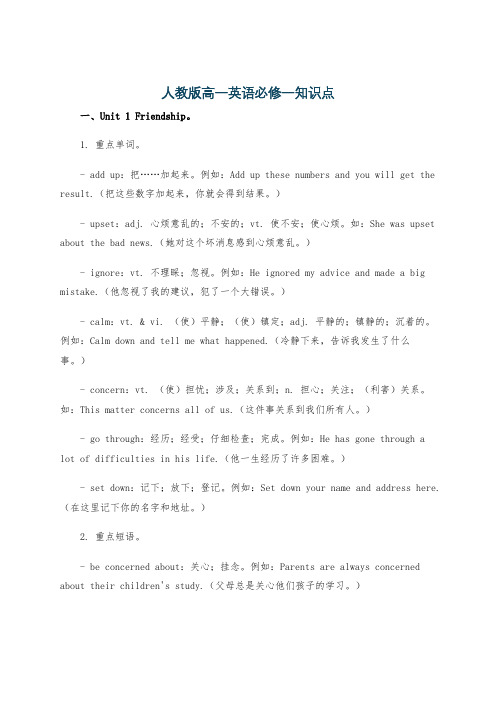
人教版高一英语必修一知识点一、Unit 1 Friendship。
1. 重点单词。
- add up:把……加起来。
例如:Add up these numbers and you will get the result.(把这些数字加起来,你就会得到结果。
)- upset:adj. 心烦意乱的;不安的;vt. 使不安;使心烦。
如:She was upset about the bad news.(她对这个坏消息感到心烦意乱。
)- ignore:vt. 不理睬;忽视。
例如:He ignored my advice and made a big mistake.(他忽视了我的建议,犯了一个大错误。
)- calm:vt. & vi. (使)平静;(使)镇定;adj. 平静的;镇静的;沉着的。
例如:Calm down and tell me what happened.(冷静下来,告诉我发生了什么事。
)- concern:vt. (使)担忧;涉及;关系到;n. 担心;关注;(利害)关系。
如:This matter concerns all of us.(这件事关系到我们所有人。
)- go through:经历;经受;仔细检查;完成。
例如:He has gone through a lot of difficulties in his life.(他一生经历了许多困难。
)- set down:记下;放下;登记。
例如:Set down your name and address here.(在这里记下你的名字和地址。
)2. 重点短语。
- be concerned about:关心;挂念。
例如:Parents are always concerned about their children's study.(父母总是关心他们孩子的学习。
)- on purpose:故意。
例如:He broke the cup on purpose.(他故意打破了杯子。
高中英语人教版必修1知识点汇总

必修1Unit1核心单词1. addvt.& vi. 增加;加;加起来;补充说;又说常用结构:①add to增添;增加;增进②add ...to ...把…增添到…③add up合计,相加④add up to总数为;总计为He added some wood to increase the fire.他添了一些木柴,使火更旺些。
2. upsetadj. 心烦意乱的;不安的;不适的vt. ( upset, upset) 使不安;使心烦;打翻;打乱联想拓展①be upset by...被……打乱②upset oneself about sth.为某事烦恼Our arrangements for the weekend were upset by her visit. He was horribly upset over her illness.她一来把我们周末的安排给打乱了。
他为她的病而忧心忡忡。
Don’t upset yourself — no harm has been done. The students really upset her.不要难过——并没有造成任何伤害。
学生们着实让她烦恼。
3. ignorevt. 不理睬;忽视I said hello to her, but she ignored me completely. He ignored the speed limit and drove very fast.我向她打招呼,可是她根本不理我。
他不顾时速限制,把车开得飞快。
联想拓展①ignorant adj. (对某事物)不了解的;无知的;无学识的②be ignorant of/about sth.不知道;没有意识到③ignorance n.无知;愚昧;不知道④be in ignorance of/about sth. 不知道某事易混辨析ignore/neglect/overlookignore 通常指有意不顾,或不理会显而易见的事物。
人教高中英语必修一各单元知识点汇总

人教高中英语必修一各单元知识点汇总Unit 1 Friendship1. Vocabulary: adjectives to describe people's characteristics (e.g. reliable, outgoing, generous, etc.)3. Reading: Understanding the main ideas and details in a reading passage, inferring the meaning of words from context4. Writing: Writing a letter of introduction, using appropriate greetings and closing statements5. Speaking: Discussing qualities of a good friend, expressing agreement or disagreement, expressing preferences Unit 2 English around the world1. Vocabulary: words related to language learning (e.g. fluent, bilingual, etc.), words related to education (e.g. curriculum, instruction, etc.)2. Grammar: Using "used to" to talk about past habits or states, using "would" to talk about past habits, using "will" and "would" to talk about future actions or intentions3. Reading: Understanding different types of texts (e.g. advertisements, news articles, etc.), inferring the purpose or tone of a text4. Writing: Writing an article about language learning, using appropriate structure and language5. Speaking: Discussing the importance of learning English, expressing opinions, giving reasons and examplesUnit 3 Travel journal1. Vocabulary: words related to travel and tourism (e.g. destination, ecotourism, etc.)2. Grammar: Using the present perfect tense to talk about experiences, using the present perfect continuous tense to talk about activities that started in the past and continue in the present3. Reading: Understanding a travel journal entry,identifying the main idea and supporting details4. Writing: Writing a travel journal entry, using appropriate descriptive language and organizing ideas chronologically5. Speaking: Discussing travel experiences, describing places visited, expressing preferences and opinionsUnit 4 Body language2. Grammar: Using the present continuous tense to talk about temporary actions or states, using the present simple tense to talk about general truths or habits3. Reading: Understanding an article about body language, understanding the purpose or main idea of a text4. Writing: Writing a dialogue about a misunderstanding due to body language, using appropriate dialogue format5. Speaking: Discussing cultural differences in body language, interpreting gestures and facial expressions, role-playing scenarios involving body language misunderstandings Unit 5 Nelson Mandela1. Vocabulary: words related to politics and human rights(e.g. apartheid, injustice, etc.)3. Reading: Understanding a biography of Nelson Mandela, identifying key events and milestones in his life4. Writing: Writing a biographical sketch about a famous person, using appropriate structure and language5. Speaking: Discussing the impact of Nelson Mandela's actions, expressing opinions on social justice issues, making connections between historical events and current events Unit 6 Inventors and inventions1. Vocabulary: words related to inventors and inventions(e.g. innovation, patent, etc.)2. Grammar: Using the present perfect tense to talk about achievements and discoveries, using the present perfect continuous tense to talk about actions or states that started in the past and continue in the present3. Reading: Understanding a passage about inventors and inventions, identifying the main idea and supporting details4. Writing: Writing a paragraph about a famous invention, using appropriate descriptive language and providing historical context5. Speaking: Discussing the significance of inventions, debating the ethics of scientific discoveries, predicting future inventionsUnit 7 Teenagers should be allowed to choose their ownclothes1. Vocabulary: words related to clothing and fashion (e.g. dress code, trend, etc.)2. Grammar: Using modal verbs to express possibility, permission, prohibition, etc., using conditional sentences to express hypothetical situations3. Reading: Understanding an argumentative essay on a controversial topic, identifying the author's stance and supporting reasons4. Writing: Writing an argumentative essay on a social issue, using appropriate persuasive language and organizing ideas effectively5. Speaking: Debating the pros and cons of a social issue, expressing opinions and supporting arguments, responding to counterarguments.。
人教版(2023)高中英语必修一各章节核心考点复习提纲汇编

人教版(2023)高中英语必修一各章节核心考点复习提纲汇编第一章: 语言使用与记叙文1.1 语法和词汇- 名词、动词、形容词的基本用法和变化规则- 时态和语态的运用- 副词和介词的用法- 句子结构和基本句型1.2 记叙文的要素和结构- 记叙文的题材和主题- 主角和次要角色的描写- 时间和地点的安排- 冲突和的发展- 结尾和寓意的呈现第二章: 非记叙文的写作2.1 说明文和议论文- 说明文的定义和特点- 如何准确传达信息- 排比和比较的运用- 议论文的观点和立场- 议论文的论据和论证方式2.2 应用文的写作- 电子邮件和信函的格式和写作要点- 招聘公告和广告的语言技巧- 意见征集和调查问卷的撰写指南- 办公文书的结构和格式要求第三章: 阅读理解3.1 短文理解和推理判断- 阅读短文并理解主旨- 推理判断作者的意图和观点- 根据上下文推断词义- 利用线索找出事实和细节3.2 阅读技巧和策略- 标题和段落的作用和结构- 图表和图像的解读方法- 标点符号的读法和理解- 阅读速度和注意力的调整第四章: 写作表达4.1 句子和段落的组织- 句子结构的多样性和变化- 逻辑连接词的运用- 主题句和段落结构的规范4.2 写作技巧和修辞手法- 修辞手法的种类和运用- 引用和扩展观点的方法- 适当措辞和表达方式的选择第五章: 影视赏析5.1 影视元素和表达手法- 影视作品的题材和类型- 摄影和音乐对故事的表达效果- 导演和演员对角色的诠释- 剪接和配乐的艺术处理5.2 影视评论和观影感受- 提出对影视作品的评价- 分析影片中的情节和人物- 探讨影片所要传递的主题- 针对个人观影感受的总结以上为《人教版(2023)高中英语必修一》各章节核心考点的复习提纲汇编,希望能够帮助你更好地复习和准备高中英语考试。
- 1、下载文档前请自行甄别文档内容的完整性,平台不提供额外的编辑、内容补充、找答案等附加服务。
- 2、"仅部分预览"的文档,不可在线预览部分如存在完整性等问题,可反馈申请退款(可完整预览的文档不适用该条件!)。
- 3、如文档侵犯您的权益,请联系客服反馈,我们会尽快为您处理(人工客服工作时间:9:00-18:30)。
(非常全)人教高中英语必修一各单元知识点汇总主要内容包括:一、重点短语二、语法目录:Unit OneFriendshipUnit twoEnglisharoundthe worldUnit 3 TraveljournalUnit four EarthquakesUnit5 NelsonMandela– a modern heroUnitOne Friendship一、重点短语1.gothrough 经历,经受getthrough 通过;完成;接通电话2.set down记下,放下3.aseries of一系列4.on purpose 有目的的5.in orderto为了6. atdusk 傍晚,黄昏时刻7. face toface面对面8.fall inlove爱上9. joinin 参加(某个活动);takepartin 参加(活动)join加入(组织,团队,并成为其中一员)10. calm down 冷静下来11. sufferfrom 遭受12.be/get tiredof…对…感到厌倦13.be concernedabout关心14.get on/along well with 与…相处融洽15.be good at/d owellin 擅长于…16.findit+adj.to do sth. 发现做某事是…17. no longer / not …any longer不再…18.toomuch 太多(后接不可数n.)much too太…(后接adj.)19. not…until直到…才20. it’sno pleasure doing sth做…并不开心21. make sb.sth.使某人成为…makesb.dosth. 使某人做某事二、语法----直接引语和间接引语概念:直接引语:直接引述别人的原话。
一般前后要加引号。
间接引语:用自己的话转述别人的话。
间接引语在多数情况下可构成宾语从句且不要加引号。
例: Mr. Black said, “I’m busy.”Mr. Black saidthat he was busy.变化规则(一)陈述句的变化规则直接引语如果是陈述句,变为间接引语时,用连词that(可省略)引导,从句中的人称、时态、指示代词、时间状语、地点状语都要发生相应的变化。
人称的变化——人称的变化主要是要理解句子的意思例:1.He said, “ I like it verymuch.”→Hesaid that he likedit very much.2. He saidto me,“I’v leftmybook in your room.”→He told me thathe had left his bookinmyroom.时态的变化例:“Idon’t want toset down a series of facts in a diary,” saidAnne.→Anne said that shedidn’t want toset downaseriesof facts in a diary. The boysaid, “I’m using a knife.”→The boysaidthat he was using a knif e.▲注意:如果直接引语是客观真理,变为间接引语时,时态不变,如:He said, “Light travels much faster than sound.”He saidthat lighttravels much faster than sound.指示代词、时间状语、地点状语和动词的变化(二) 祈使句的变化规则如果直接引语是祈使句,变为间接引语时,要将祈使句的动词原形变为带to的不定式,并根据句子意思在不定式前加上tell/ask/order等动词,如果祈使句是否定句,在不定式前面还要加上not。
例:The hostess said to us,“Please sitdown.”→The hostessasked us tosit down. Hesaid, “Don’t make so muchnoise, boys.”→He told theboysnotto mak eso much noise.(三)疑问句的变化规则如果直接引语是疑问句,变为间接引语时要把疑问句语序变为陈述句语序,句末用句号。
一般疑问句:如果直接引语是一般疑问句,变为间接引语时,谓语动词是say或said时,要改为ask或asked,原问句变为由if/whether引导的宾语从句。
例:“Do youthink a diary can become your friend?” the writersays.→Thewriter asksus if we thinkadiary can become our friend.2) 特殊疑问句:如果间接引语是特殊疑问句,变为间接引语时,仍用原来的引导词,但疑问句要变为陈述句。
例:“What do youwant?”heaskedme.→He asked me what I wantedUnittwo Englisharoundtheworld一、重点短语1. be different from与…不同be the same as 与…一样2. one another 相互,彼此(=eachother)3. officiallanguage 官方语言4. attheendof在…结束时5. because of因为(后接名词或名词性短语)because 因为(后接句子)6. native speakers 说母语的人7.be based on 根据,依据8. at present 目前;当今9.especially 特别,尤其specially 专门地10. make use of 利用…makethe best of 充分利用…11. a large number of 大量的,很多(作主语,谓语动词用复数)the numberof …的数量(作主语,谓语动词用单数)12.in fact =actually=as a matter of fact 事实上13.believe itor not信不信由你14. there is nosuch thingas…没有这样的事…15. be expected to …被期待做某事16.play a part/rolein …在…起作用17. make listsof…列清单18.included 包括(前面接包括的对象)Including包括(后接包括的对象)19. command sb. todosth.命令某人去做某事command + that 从句(从句用should+V原20.request sb. todo sth.要求某人做某事request+that 从句(从句用should+V原) 二、语法----英语中的命令(command)语气和请求(request)语气命令语气:表示直接命令某人做某事,语气比较重,不怎么礼貌,一般用于上级对下级例:1. “ Look at the example”, theteacher said to us. 2. Open the window!请求语气:表示请求某人做某事,语气比较缓和,非常礼貌例:1. “Would you liketo see my flat?”She asked. 2. Would you please openthewindow?Unit 3Travel journal一、重点短语1. travel----泛指旅行journey----指长时间长距离的陆上旅行voyage----指长距离的水上旅行,也可以指乘飞机旅行trip----常指短时间短距离的旅行tour----指周游,巡回旅游,2.prefer to 更加喜欢,宁愿prefer A to B 比起B,更喜欢Aprefer doing to doing 比起做…,宁愿做…prefer to do rather than do与其做…, 不如…3. flowthrough流过,流经4.ever since 自从5.persuade sb. to do sth.说服某人做某事6. be fondof 喜欢7. insiston doing 坚持做某事insist+that 从句(用should+ V原)8. care about 关心. change one’smind改变想法10. altitude高度attitude 态度,看法11.makeup one’s mind todo下定决心做某事= decideto do= make a dec ision to do12. give in让步,屈服giveup放弃13. be surprisedto …对…感到惊奇toone’s surprise 令某人惊讶的是…14. atlast =finally =in theend 最终15. stoptodo 停下来去做某事stopdoing停止做某事16. as usual 像往常一样17.so…that 如此…以至于… So + adj+a/an+ n.+ thatSuch + a/an+adj.+ n. + that18.be familiar with对…熟悉(人作主语)be familiarto为…所熟悉(物作主语)二、语法:现在进行时表将来现在进行时表将来,表示最近按计划或安排要进行的动作,常见的现在进行时表将来的动词有:come /go / leave/ arrive /travel/take / stay/do等.例:1.I’m coming.我就来2.what are you doing nextSunday? 你下个星期天做什么?3. Ihear thatyouaretravelling along Mekong River.我听说你将沿湄公河旅行4. Where are you staying at night?你们晚上待在哪里/Unitfour Earthquakes一、重点短语1. right away 立刻,马上(= at once = in notime)2.asleep睡着的;熟睡地(fall asleep 入睡)sleep 睡;睡眠sleepy犯困的3. it seems that/ as if …看来好像…;似乎4.inruins 成为废墟5.the number of …的数量(谓语动词用单数) a number of 大量(谓语动词用复数)6. rescue workers营救人员Come to one’s rescue 营救某人7.be trapped被困8. how long 多长时间how often 多久,指平率how soon 还要多久(用于将来时当中,用in+时间段回答)9. hundreds ofthousands of 成千上万的10.dig out挖出11.shake----泛指“动摇,震动”,常指左右、上下动摇,也可以指人“震惊,颤抖”例:1. She felt the earthshaking under him. 2.She wasshaken with anger.quake---- 指较强烈的震动,如地震例: The building quaked on its foundation Tremble---- 指人由于寒冷、恐惧、不安等引起的身体的抖动或声音的颤抖例:SuddenlyI saw her lipsbegin to trembleand tears begin toflowdownher cheeks.Shiver---- 多指寒冷引起的颤抖、哆嗦例:Asudden gust of cold wind mademe shiver.12. rise (rose—risen)---- vi,上升;升起, 无被动语态;give rise to 引起Raise(raised—raised)---- vt,举起;筹集;养育Arise(arose—arisen)----vt,出现(常指问题或现象)13.injure----常指因意外事故造成的损伤,也可以指感情上名誉上的伤害例:He wasinjuredin a car accident.harm----泛指“伤害,损害”,既可以指有生命的,也可以指无生命的例:1.Hewas afraid that hisfury would harm the child.2. His business washarmed for some reason.hurt---- 既可以指肉体上的伤害,也可以指精神上的伤害例:1.She hurtherleg when she fell. 2.He felt hurt at yourword.wound---- 一般指枪伤、刀伤等在战场上受的伤例:Thebulletwounded him in t he arm.14. bepreparedfor …=make preparations for…为…做准备15. inone’s honor 向…表示敬意;为纪念Be/feel honoredto do …做…感到很荣幸16. make /give/deliver a speech发言opening speech开幕词17.give/ provide shelter to…向…提供庇护所seek shelter from…躲避18. happen to+n./pron. 遭遇,发生happen to do sth.偶然;碰巧happen----指偶然发生take place----指事先计划好的事情发生二、语法----定语从句概念:在复合句中,修饰名词或代词的从句叫做定语从句。
